Integrative Affects of Urban Public Space
Nowadays a growing majority of the world population live in urban environments. Cities in general and the public spaces within cities in particular are the places where human encounters and exchanges take place. The socio-spatial as well as the physical and built shape of urban development affect the chances and quality of life people have (Brenner & Schmid, 2014). Cities are the hotspots and nodes of modern societies, where social, political and economic integration takes place.
Urban studies have increasingly emphasised the socially and politically contested dimensions of public space, and as a consequence focussed on the structural, processual and institutional formations (Low & Smith, 2013), while at the same time neglecting the material and emotional or affective aspects (Reckwitz, 2012). Nevertheless, the challenges of integration, exclusion, disintegration, fragmentation in urban places are more urgent than ever. People living together in cities are more than parts in an urban machine and are more than objects of political regulation. They are deeply cultural and also embodied emotional subjects. Recent work has begun to develop concepts and methods for understanding public spaces as affective and emotional places (Böhme, 2017; Hasse, 2014; Griffero, 2014; Schmitz et al., 2011).
In this Alexander von Humboldt Lecture series we take forward this work by exploring the affective dimensions of urban public spaces. Beginning by reframing the public spaces of cities as spaces of affect and emotion, we will focus on how integration is a matter of how urban experience is patterned, lived and organised. Problems of integration, exclusion, disintegration, fragmentation as played out in the public space of our future cities can only be understood and effectively dealt with if we also take these material and affective aspects into account.
Objectives
- How do specific collective affects support, undermine, enable or otherwise affect transformative integration?
- How might urban policy and urban design in relation to transformative integration take collective affects into account?
Contribution to the debate on Public Spaces: Culture and Integration
There are four main issues we want to raise: First, we address a novel retheorisation of transformative integration that understands it as the coming together of differences in the midst of specific affective-material contexts and processes. Second, by applying this conceptual framework for transformative integration to different occasions of urban integration and change we want to ask how integration can and should happen. Third, we also want to discuss new methodological approaches by utilising a critical phenomenological approach to the affective integrative dimension of space combined with a real transnational approach towards integration. Specifically, we try to overcome the methodological individualism of existing approaches by focusing on the ensemble of practices and associated affects and emotions that form public spaces. Finally: we want to address how these insights inspire and reflect the field of practical policy making so that inclusive public places can be produced through practical placemaking. Together this results in a truly innovative perspective to these debates, which should also spark further research work and publications in this direction.
Programme
This years programme is conducted in close cooperation with the Cultural Geography Group of Wageningen University
Alexander von Humboldt Lecture
and Opening Lecture of the 2019-2020 Human Geography Master Programme
Wednesday 04.09.2019, 17:30-18:45, Theatre Hall C, on the ground floor of the Elinor Ostrom building, Heyendaalseweg 141, NL-6525AJ Nijmegen
(free entrance)
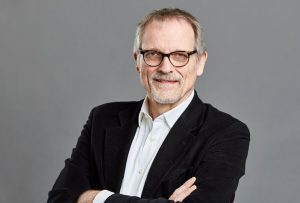 Prof. Jürgen Hasse, Goethe University Frankfurt am Main, Germany (http://jhasse.com/)
Prof. Jürgen Hasse, Goethe University Frankfurt am Main, Germany (http://jhasse.com/)
Urbanity – between atmospheres and moods
Abstract: Urbanity has architectural, physical and other structural presuppositions. Above all, it has a performative dimension. This is cognitively dispositioned by what people decide to do and to be. But it is also affectively tuned by what people do practically (often enough against better knowledge). The gestures of symbolic interaction follow the path of bodily communication, just exceptionally in words. So quarters are silently marked as exclusive spaces. Through gestural action (usually not through an action) others are integrated into the common or affectively excluded. The body of the city is formed performatively – and not as a result of intelligent planning – it owes its success to its performativity and will constitute a collage of urban “bodily islands”. The public space of the city is tuned on the background of both stative and actual situations. These tuning powers give rise to atmospheres that give a feeling of urbanity in the form of moods and suggest specific milieu qualities. What happens in the seismic field of the urban is essentially directed d controlled by feelings. What are the media of their communication? With regard to research, finally the question will arise how one can talk about feelings.
Thursday, 05.09.2019, 12:30-14:15, Ulbo de Sitter room, ground floor of the Elinor Ostrom building, Heyendaalseweg 141, NL-6525AJ Nijmegen
Seminar with Prof. Jürgen Hasse about Methods to investigate Atmospheres
Friday, 06.09.2019, 10:30-12:15, Ulbo de Sitter room, ground floor of the Elinor Ostrom building, Heyendaalseweg 141, NL-6525AJ Nijmegen
Research colloquium of researchers of Radboud University, and Wageningen University, presenting their work to Prof. Jürgen Hasse
Alexander von Humboldt Lecture
Monday 30.09.2019, 17:30-18:45, Former Chapel in the Bergmanianum, Houtlaan 4, NL-6525XZ Nijmegen
(free entrance)
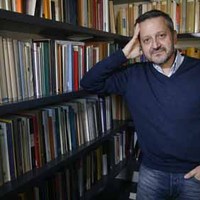
Prof. Tonino Griffero, Università di Roma “Tor Vergata”, Italy (http://uniroma2.academia.edu/toninogriffero)
“Genoa for us”: Urban atmospheres and felt-bodily resonances
Abstract: The urban atmosphere is the polysensorial-amodal “skin” of the city. Inspired by a pathic aesthetics and the New Phenomenology, but also freely using here a Paolo Conte’s song (quoted in the title) as an example, my lecture focuses on the aesthetic-phenomenological notion of “atmosphere” and its key-role in architecture and urban life. It aims, first of all, at investigating what the immersive impression of a city consists of, secondly at de-axiologising the notion of urban atmosphere in order to better understand what its “authority” is, thirdly at explaining on which form of felt-bodily communication and resonance it is based. It would be necessary, finally, to criticize the usual idea according to which an urban atmosphere must necessarily mean either an organicistic familiarity or an avant-garde subversion of the social space.
Tuesday, 01.10.2019, 12:30-14:15, Room EOS N 01.740 first floor of the Elinor Ostrom building, Heyendaalseweg 141, NL-6525AJ Nijmegen
Seminar with Prof. Tonino Griffero
Wednesday, 02.10.2019, 10:30-12:15, Ulbo de Sitter room, ground floor of the Elinor Ostrom building, Heyendaalseweg 141, NL-6525AJ Nijmegen
Research colloquium of researchers of Radboud University, and Wageningen University, presenting their work to Prof. Tonino Griffero
Alexander von Humboldt Lecture
Monday 14.10.2019, 17:30-18:45, Former Chapel in the Bergmanianum, Houtlaan 4, NL-6525XZ Nijmegen
(free entrance)
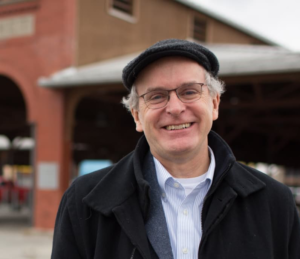 Steve Davies, Project for Public Spaces (PPS), New York, USA (www.pps.org/people/sdavies)
Steve Davies, Project for Public Spaces (PPS), New York, USA (www.pps.org/people/sdavies)
Creating “Market Cities”: Leveraging the power of public markets as public spaces
Abstract: There are thousands if not millions of fresh food public markets around the world that link urban and rural communities and economies. These markets take many forms – from open-air, mobile markets to permanent market halls to entire market districts. This lecture will focus on the economic and social value these often under-valued markets bring as fulcrum points for fostering active and inclusive public space in cities, while also promoting job creation, economic development, positive social networks, safe and nurturing public spaces, and access to affordable, fresh and healthy foods. Case studies of market transformations will illustrate the value public markets can bring to communities, using examples from the United States and, by contrast, from Hanoi, Vietnam.
This lecture will also introduce the concept of “Market Cities”, a new vision for public markets at a city-wide scale. Market Cities make holistic assessments of all their market systems to develop supportive policies and leverage market assets to promote job opportunities, economic development, active public spaces, and community health. Urban market systems in the 21st century can be vital centres of exchange connecting rural and urban environments and places that anchor local culture and social life for all residents. Barcelona is perhaps the best example of a modern Market City. They have an incredibly thriving network of around 43 permanent public markets serving 73 neighbourhoods
Monday, 14.10.2019, 08:30-12:00, City Hall, Burgerzaal, Korte Nieuwstraat 6, NL-6511PP Nijmegen on-location seminar in which we, together with Steve Davies, will evaluate the public market as public space.
During this three hour seminar, participants will visit and evaluate an existing market in Nijmegen while it is operating. Ideally, a location near the market should be identified for this seminary to take place. There will be a short introductory presentation about how to evaluate public markets as public spaces, followed by a group field trip to the market. Using the Project for Public Spaces, Market Place Audit, participants will work in small groups of 2 or 3 people to evaluate the market using the audit form. Returning to the workshop site, they will work in small groups (combining 2 or three teams) to summarise the key results of their findings and then present them to the full group for discussion. Management of the market can be invited to participate in the seminar as well and can add additional depth of understanding about how it functions.
Tuesday, 15.10.2019, 12:30-14:15, Ulbo de Sitter room, ground floor of the Elinor Ostrom building, Heyendaalseweg 141, NL-6525AJ Nijmegen
Research colloquium of researchers of Radboud University, and Wageningen University, presenting their work to Steve Davies
Alexander von Humboldt Lecture
Monday 11.11.2019, 17:00-18:30, Room Gaia 1+2, Gaia Building Droevendaalsesteeg 3, NL-6708PB Wageningen Campus (Public transport: bus 84 or 88 from Ede-Wageningen station, stop ‘Campus/Atlas’) https://www.wur.nl/en/location/Gaia-building-number-101.htm
(free entrance)
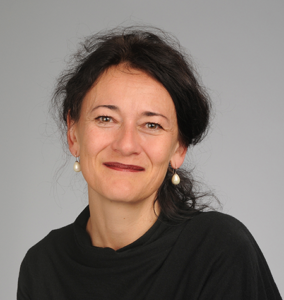 Prof. Janine Dahinden, University of Neuchâtel, Switzerland (www.unine.ch/janine.dahinden)
Prof. Janine Dahinden, University of Neuchâtel, Switzerland (www.unine.ch/janine.dahinden)
‘De-centring’ research on transnational integration and diversities? Theoretical and methodological explorations of small locations at the ‘outskirts of Europe’
Abstract: Research on the transnationalisation of social realities and the diversification of populations through mobility and migration has mainly focused on global (or smaller) cities embedded in neo-liberal economies. While these studies contribute important insights into the ways diversity is structured, lived and organised in urban spaces, they also have limitations. First, transformations outside urban centres, in places shaped by different scales of local and transnational dynamics remain largely ignored. Second, many of these studies are based on ethnicity- or nation-centred epistemologies. Third, and in line with the theme of this Alexander von Humboldt lecture series, the role of affects in living diversity has been neglected. Consequently, I argue that this field of research would benefit from theoretical and methodological ‘de-centring’. Based on an ongoing research project, I propose to study questions of transnational mobilities and diversification at the scale of small localities – villages, conglomerations of villages, or valleys at the outskirt of Europe. In addition, I apply a ‘de-naturalised’ and ‘de-migranticised’ research design to address the issues at stake. I demonstrate how small localities constitute “micro-laboratories” of human experience. Their limited spatial extension and small populations offer original and in-depth insights to mobility configurations and the ensuing diversification, boundary- and place-making. Exploring how diversity is produced, how it is socially and affectively organised and lived – locally and transnationally – at the outskirt of Europe advances the theorisation of transnational integration and diversities.
Monday, 11.11.2019, 13:00–15:00, Location Wageningen, t.b.a.
Wageningen: workshop on ‘de-migranticizing’ of our thinking about small international towns with Prof. Janine Dahinden
Wednesday, 13.11.2019, 10:30-12:15, Room EOS N 01.750 first floor of the Elinor Ostrom building, Heyendaalseweg 141, NL-6525AJ Nijmegen
Research colloquium of researchers of Radboud University, and Wageningen University, presenting their work to Prof. Janine Dahinden
Alexander von Humboldt Lecture
Monday 09.12.2019, 17:30-18:45, Theatre Hall C, on the ground floor of the Elinor Ostrom building, Heyendaalseweg 141, NL-6525AJ Nijmegen
(free entrance)
 Prof. Sophie Watson, Open University, Milton Keynes, UK (http://www.open.ac.uk/people/sw3625)
Prof. Sophie Watson, Open University, Milton Keynes, UK (http://www.open.ac.uk/people/sw3625)
City Water matters: Cultures, Practices and Entanglements of Urban Water
Abstract: Public Urban Spaces come in many different forms and modes and perform through many different media as an urban atmosphere. Urban Water, as one aspect of public urban space, is theorised in many different registers and through many different frames: crisis, infrastructure, symbol, culture, politics, management and delivery, consumption, the economic and the social. Each of these spheres are interconnected and related and not easily disentangled. Water is emblematic of the powerful interconnections between human/non-human, and nature and culture, where these entanglements are in a constant process of transforming cityscapes and landscapes, which in turn produce new waterscapes and manifestations of the ‘natural world’. Water has the capacity to make things happen, to bring new socialities and publics into being. Water is an intrinsic part of everyday life, often invisible in its workings and taken for granted, only entering public discourse and visibility when it becomes a matter of concern. Water is deeply political, implicated in relations of power and constitutive of social, cultural and spatial differences. Water is highly contested both as a resource and a site of complex meanings. This talk argues for the importance of water as a cultural object, and as a source of complex meanings and practices in everyday life, embedded in the socio-economics of local water provision which has the capacity to assemble publics and constitute multiple differences.
Tuesday, 10.12.2019, 12:30-14:15, Ulbo de Sitter room, ground floor of the Elinor Ostrom building, Heyendaalseweg 141, NL-6525AJ Nijmegen
Seminar with Prof. Sophie Watson
Wednesday, 11.12.2019, 10:30-12:15, Ulbo de Sitter room, ground floor of the Elinor Ostrom building, Heyendaalseweg 141, NL-6525AJ Nijmegen
Research colloquium of researchers of Radboud University, and Wageningen University, presenting their work to Prof. Sophie Watson
Alexander von Humboldt Lecture
Monday 13.01.2020, 16:00-17:30, Room Gaia 1+2, Gaia Building Droevendaalsesteeg 3, NL-6708PB Wageningen Campus (Public transport: bus 84 or 88 from Ede-Wageningen station, stop ‘Campus/Atlas’) https://www.wur.nl/en/location/Gaia-building-number-101.htm
(free entrance)
 Prof. Ben Anderson, Durham University, UK (http://www.dur.ac.uk/geography/staff/geogstaffhidden/?id=985)
Prof. Ben Anderson, Durham University, UK (http://www.dur.ac.uk/geography/staff/geogstaffhidden/?id=985)
Capitalism and Affective Change: A Geohistory of Boredom
Abstract: Public Spaces can contribute to affective change, but to understand affective change it is worthwhile to also look at other occasions and contexts, e.g.: What is boredom today? Does the boredom of regimented, linear time, of machine-led factory conditions and administrative procedures and timetables, still exist? Have new boredoms emerged alongside the other public moods which compose a troubled present frequently characterised under the sign of precarity and subject to the emergence of various populisms of the left and right? In this lecture, I offer a geohistory of boredom in the midst of laments and celebrations that in the wake of the collapse of distinctions between work and life, and as life is digitally mediated and, for some, felt in burnout and other affects of frenzy, boredom has disappeared. Through examples of the settling of boredom in relation to punk music, productivity apps, unemployment, Brexit, and the gig economy, amongst others, I stay with boredom to reflect on the challenges of theorising and researching affective change. How to connect changes in what is felt, by whom and how to the dynamics of capitalism and other always-already affective social-spatial formations?
Tuesday, 14.01.2020, 14:00-16:00, Koepelgevangenis ‘De Berg’, Wilhelminastraat 16, NL-6812CW 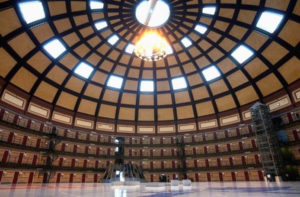 Arnhem
Arnhem
Arnhem former prison seminar. The Arnhem prison, built according to the classic Bentham panopticon design in 1886, had been in operation as a prison until 2016. We will do a guided tour and have a discussion on site with Prof. Ben Anderson, exploring boredom, incarceration and affect. with Prof. Ben Anderson
Participation is free of charge, but please register with clemens.driessen@wur.nl
Wednesday, 15.01.2020, 10:30-12:15, Ulbo de Sitter room, ground floor of the Elinor Ostrom building, Heyendaalseweg 141, NL-6525AJ Nijmegen
Research colloquium of researchers of Radboud University, and Wageningen University, presenting their work to Prof. Ben Anderson

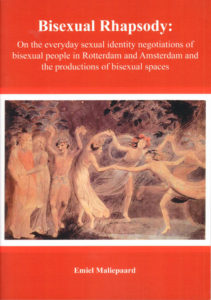 to find one’s place or we feels at home in many different places, and, therefore, feel a bit place-less. It is not always given that we are accepted at a place. Sometimes we are explicitly excluded from certain places. We also cannot always ‘make’ or ‘create’ our own place, or are ‘outplaced’ by others. There is a politics of place.
to find one’s place or we feels at home in many different places, and, therefore, feel a bit place-less. It is not always given that we are accepted at a place. Sometimes we are explicitly excluded from certain places. We also cannot always ‘make’ or ‘create’ our own place, or are ‘outplaced’ by others. There is a politics of place.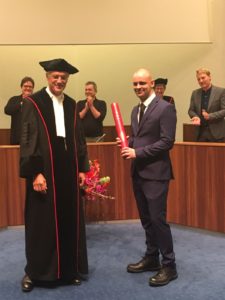 This, in a certain way, was also the main topic of a recent PhD thesis by Dr. Emiel Maliepaard in our group under the supervision of Dr. Roos Pijpers, and Prof. Huib Ernste on the ‘Bisexual Rhapsody: On the everyday sexual identity negotiations of bisexual people in Rotterdam and Amsterdam and the productions of bisexual spaces. The first PhD-thesis addressing this issue in the Netherlands and as such a path-breaking work.
This, in a certain way, was also the main topic of a recent PhD thesis by Dr. Emiel Maliepaard in our group under the supervision of Dr. Roos Pijpers, and Prof. Huib Ernste on the ‘Bisexual Rhapsody: On the everyday sexual identity negotiations of bisexual people in Rotterdam and Amsterdam and the productions of bisexual spaces. The first PhD-thesis addressing this issue in the Netherlands and as such a path-breaking work.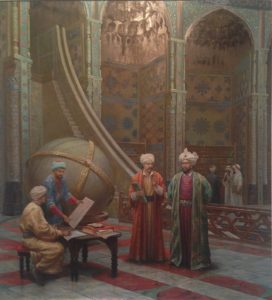 Traveling this summer through Kirgistan and Uzbekistan, provided us with great new experiences and knowledge of places we did not know enough of before. Since we moved into a new university building last Christmas, and still need to make that new place to ‘our’ place… it was fascinating to see this early university built by one of the founding fathers of our today’s science, and one of the founding fathers of our own discipline Geography, Ulugh Beg, and what this place expresses and how it impresses you when strolling through them. Then you get the feeling that the architect of our modern, transparent, and unrecognisably similar to almost all modern office buildings all over the world, could have done better in making a special place for science… The art of place making…
Traveling this summer through Kirgistan and Uzbekistan, provided us with great new experiences and knowledge of places we did not know enough of before. Since we moved into a new university building last Christmas, and still need to make that new place to ‘our’ place… it was fascinating to see this early university built by one of the founding fathers of our today’s science, and one of the founding fathers of our own discipline Geography, Ulugh Beg, and what this place expresses and how it impresses you when strolling through them. Then you get the feeling that the architect of our modern, transparent, and unrecognisably similar to almost all modern office buildings all over the world, could have done better in making a special place for science… The art of place making…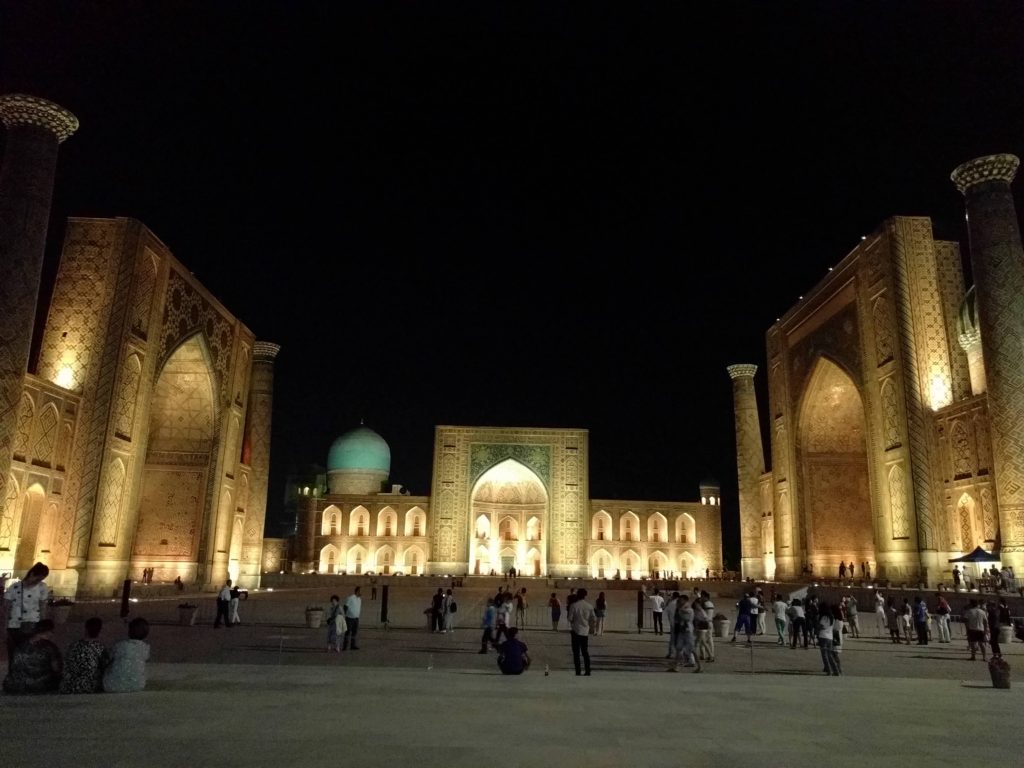
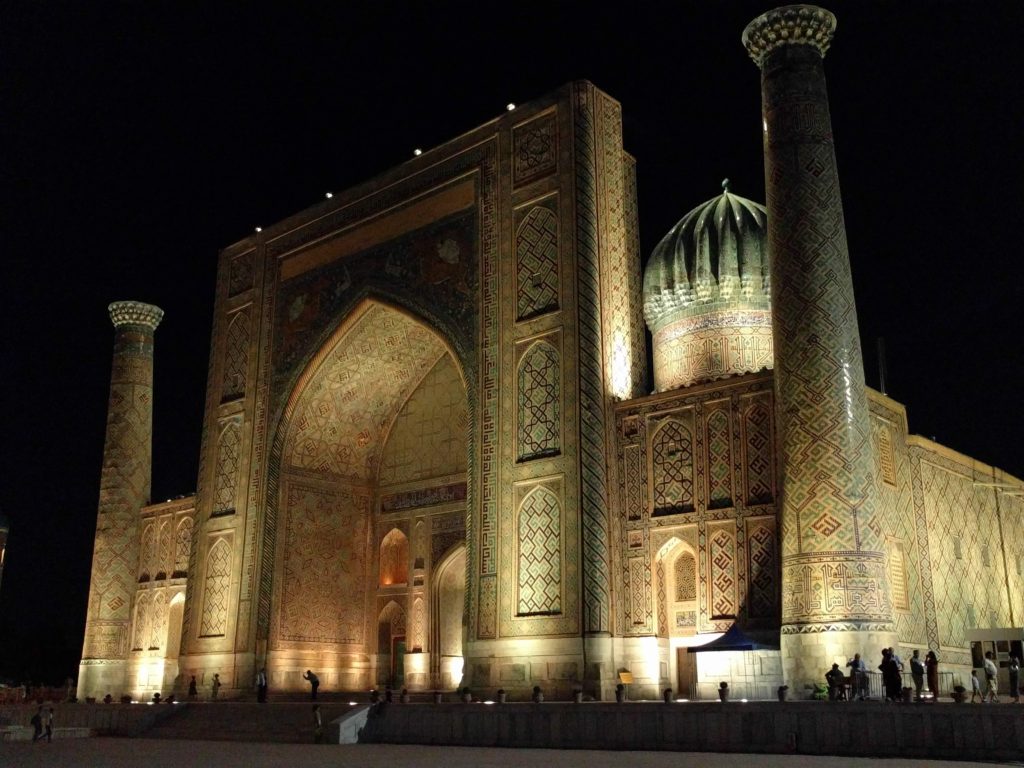
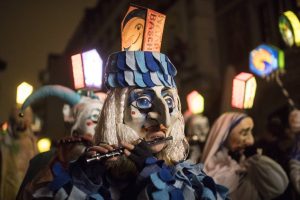
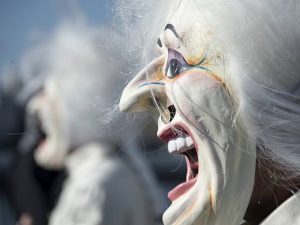 While in most catholic areas carnival 2018 finished last wednesday. Today, in protestant, Basle (Switzerland), the city where my Daughter lives and studies, at 04:00 hours in the morning the characteristic Carnival Cortége (“Morgenstreich”) is conducted accompanied by drummers and pipers, through the totally dark city, a jovial, yet serious melancholic atmosphere. The event combines unique musical instruments, creativity and ideas, and first-rate artistic performances. This is where
While in most catholic areas carnival 2018 finished last wednesday. Today, in protestant, Basle (Switzerland), the city where my Daughter lives and studies, at 04:00 hours in the morning the characteristic Carnival Cortége (“Morgenstreich”) is conducted accompanied by drummers and pipers, through the totally dark city, a jovial, yet serious melancholic atmosphere. The event combines unique musical instruments, creativity and ideas, and first-rate artistic performances. This is where 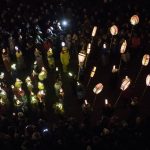 socio-political topics, stories and current events are communicated in a typical Basel manner: proudly, with acerbic wit and biting humour. It recently has been added to the UNESCO intangible cultural heritage list. A great example for how such an event can ‘make a place’.
socio-political topics, stories and current events are communicated in a typical Basel manner: proudly, with acerbic wit and biting humour. It recently has been added to the UNESCO intangible cultural heritage list. A great example for how such an event can ‘make a place’.